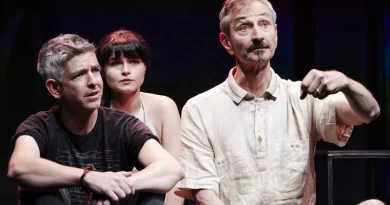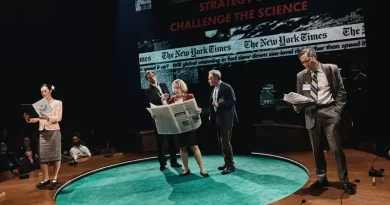“Manhunt” at Royal Court Theatre Downstairs
Franco Milazzo in West London
9 April 2025
After Jack Thorne’s TV drama Adolescence and James Graham’s critically acclaimed play Punch, along comes writer-director Robert Icke’s Manhunt with impeccable timing to complete a hat-trick of searing toxic masculinity dramas. This isn’t the first time Icke has created a timely work. Last year, his modern take on Oedipus starring Mark Strong and Lesley Manville made a huge impact (and has just won a couple of Olivier Awards).

Photo credit: Manuel Harlan.
However, Icke’s latest effort sees him take a bit of a career gamble. He is best known for adapting the classic dramas of others but here in his first original play he takes on a real-life story that dominated headlines 15 years ago. Raoul Moat’s release from prison in July 2010 began a chain of events that saw him shoot an ex-lover, her new boyfriend, and a policeman before hiding out in the Northumberland countryside. There were many twists and turns – including a bizarre intervention from footballer Paul “Gazza” Gascoigne – before the police hunt came to an end.
The framing device sees Moat railing against a prosecutor about whether to turn himself in or not. He has no desire to go back to jail and be separated from his children but he has negligible faith in social workers, the local cops, or judges. This is patently a fictional construct (surrounded by police, the real Moat ending up shooting himself in the head rather than surrendering) but allows us a chance to hear what could have been his inner thoughts and motivations.
The direction is jolting, flipping often from past memories of Moat as a physically and emotionally abused child to his present journey. His bald head shining with sweat, Samuel Edward-Cook brings a muscular approach to the role with rare streaks of self-awareness. He often addresses the stalls (those sat upstairs may struggle to feel engaged), metaphorically beating his chest even as he inflicts actual brutality on those around him, not least his partner Samantha Stobbart (Sally Messham, who played the same role in the 2023 TV version of this story).
It’s difficult to tell whether Icke is painting his subject as a caricature or something more. Between dips into his painful childhood, we hear Moat described by himself or others as Frankenstein’s monster, a hunter-gatherer, and a hulk. The bruiser turned tree surgeon talks about being King Kong atop the tower swatting at planes and one of the first things he does is pick up his “car with six wheels” (a sawn-off shotgun and six cartridges) and have his hair shaved off; he asks for a Mohican cut “just like Travis Bickle”. There are points when we can almost believe that all he wants to be is a good dad but – as he will lose his council house unless he gains custody of his children – even these moments come across as self-serving.
This being Icke, there are no shortage of cute theatrical tricks thrown in but there are two particularly outstanding throws of the dice. The entire room is blacked out for 12 minutes as we hear of the policeman Moat shot after he attacked Stobbart and her partner. Sitting in his car in a layby, David Rathband describes how he hears a loud noise, a bright light, and then nothing more until he wakes up permanently blind. Through a series of text messages above the stage (not particularly visible from the circle), he relays how he loses his job, his marriage breaks down, and how his thoughts lead him to his eventual suicide. It’s an incredibly affecting scene that underscores the seismic effects of Moat’s actions long after the headlines faded away.
The second gamble is the introduction of Gascoigne towards the end (played by Trevor Fox). The prodigiously talented Geordie footballer of the Nineties lost his way through injury, alcoholism, and drugs and – thanks in no small part to his phone being hacked – his wayward life became a regular focus of the media. While Moat was holed up and surrounded by the police, the ex-England footballer turned up wearing a dressing gown and holding a fishing rod, proclaimed his friendship with “Moaty”, and tried to walk through the cordon.
In reality, Gazza was stopped and turned away but Icke imagines a conversation between the pair. Clearly inebriated, he recalls his own career trajectory and says he could have been as big as Pelé and Maradona before turning to the fugitive and declaring, “We both could have been amazing!” Rather than the pathetic loser painted by the press, Icke gives him a somewhat more sympathetic portrayal. He even goes so far as to turn Gazza into some kind of inspirational father-figure, urging his mate to give himself up for the sake of his family and a sunnier future.
Icke proves himself here a more able director than writer with his staging far more effective than his script. There are strong central performances from Edward-Cook and Messham but Manhunt lacks the visceral impact of Punch or the sinister confidence of Adolescence. Amid the constant raging speeches and drip-drip-drip of exposition via dialogue or half-hidden overhead screens, the messaging occasionally gets lost in the weeds. Whether our focus should be on the bigger societal issues thrown up by this and other shows, Moat’s treatment by the media (he ponders aloud if we would ever have heard of him if it wasn’t for the newspapers’ eagerness to report his violent acts), or a character study of a flawed man is never clear.









